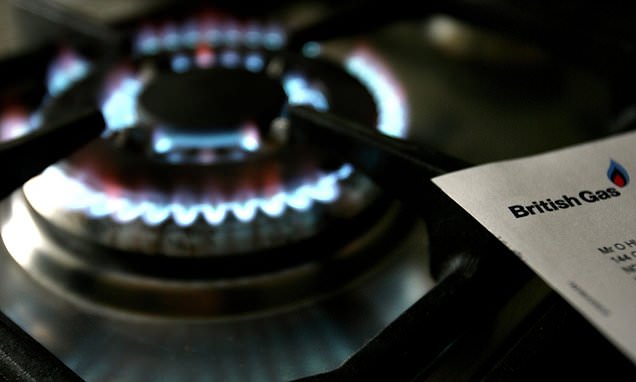Yes, British Gas’s £1billion profit looks bad… But our bills ARE now falling, writes ALEX BRUMMER
- Statutory profits for owner Centrica reached £6.4 billion in first half of 2023
- Over the same period last year, it made statutory losses of £1.1 billion
The optics are awful. While more than seven million British Gas customers were being battered by high energy bills, earnings at Britain’s largest gas supplier jumped tenfold in the first six months of this year to £969 million.
Overall, statutory profits for owner Centrica – with its extensive North Sea oil interests and a substantial stake in the UK’s nuclear industry – reached a dizzying £6.4 billion.
Compare that to the same period last year, in which it made statutory losses of £1.1 billion.
Over the decades Centrica, deservedly, has been condemned for its ‘rocket and feather’ approach to energy prices. That is, putting up prices rapidly when wholesale gas and electricity prices go up, but delaying the downward adjustment to tariffs when market prices fall.
Overall, statutory profits for owner Centrica – with its extensive North Sea oil interests and a substantial stake in the UK’s nuclear industry – reached a dizzying £6.4 billion
In the last year the picture has been distorted by the Government-imposed price cap. This allowed British Gas to improve its margins – the difference between what it pays for wholesale energy and what it charges consumers.
The margin jumped from 1.1 per cent in the period 2019-22 (when the company made losses) to 1.9 per cent in the first half of this year, in line with the prices cap.
Speaking to me yesterday, chief executive Chris O’Shea said this ‘distortion’ would disappear in the coming months. Nevertheless, the vast scale of the earnings announced this week is certain to be seized upon as evidence of profiteering from a company that in March awarded hard-bitten, moustached Glaswegian boss O’Shea £4.5million in pay and bonuses.
It is an eye-watering sum, particularly in the light of the prepayment meter scandal early this year.
In February, British Gas was told by the energy watchdog Ofgem to suspend the forced installation of prepayment meters after it was disclosed that a debt-collecting agency it used had been breaking into homes of the most vulnerable people to put in meters.
Although O’Shea apologised, and British Gas is putting aside £100m this year to help vulnerable consumers, it was a very bad look for the firm.
Combined with the soaring profits, it has encouraged trade union Unite to demand hysterically that both the Government and Labour ‘grasp the nettle’ and take the company back into public ownership.
Yet the outlook for the second half of the year will be very different since wholesale energy prices are plummeting, as I discovered when I was told that my own monthly direct debit is to be reduced from a £366.74 per month to £173.49.
While more than 7 million British Gas customers were being battered by high energy bills, earnings at Britain’s largest gas supplier jumped tenfold in the first six months of this year to £969 million
Over the next six months British Gas says £2.5 billion should be wiped off bills, and British Gas profits will fall commensurately.
Moreover, Centrica’s booming profits will actually contribute £650 million to the Exchequer thanks to the new, higher corporation tax rate – up from 19 per cent to 25 per cent in the March budget – and the windfall levy on its North Sea oil production.
And under O’Shea’s leadership, Centrica is recognising it has a critical role to play in the UK’s energy security. It has reopened the UK’s largest gas storage facility, Rough, and has pledged £4 billion into bolstering Britain’s energy supplies over the next five years. It has also secured vast new supplies of liquefied natural gas from the US.
British Gas is never going to be the nation’s pin-up. Its profits are an easy target for green zealots and opposition parties. But it has learnt its lessons from the past, and is seeking to make amends by putting the nation’s energy security first.
Source: Read Full Article


